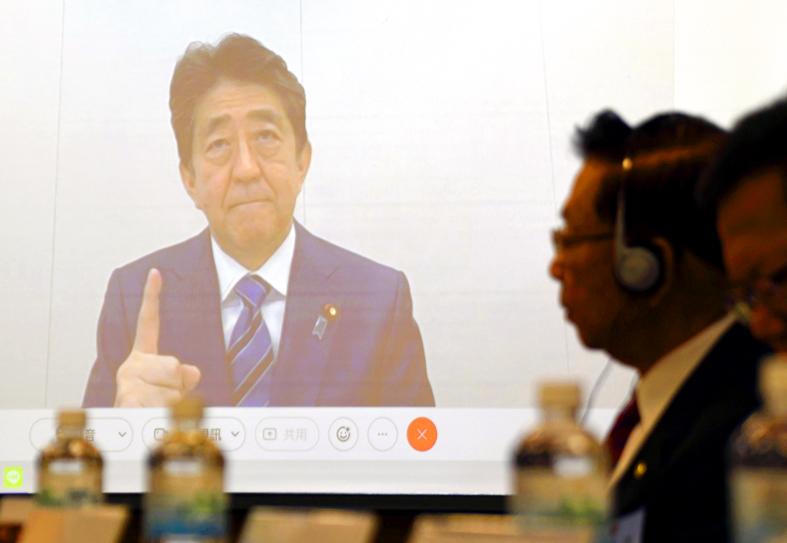Former Japanese prime minister Shinzo Abe in an interview voiced concern that China’s quest to unify Taiwan is no longer a distant threat, considering the “new militarism” driven by Chinese President Xi Jinping’s (習近平) own ambition.
“Xi Jinping is consolidating his power base and he’s no longer hiding his ambitions toward Taiwan,” Abe told Hudson Institute Japan Chair deputy director Riley Walters and Georgetown University master’s candidate Eleanor Shiori Hughes in an interview conducted before Russia’s invasion of Ukraine.
As Xi gains more political power, Abe said he is afraid a move on Taiwan or disputed territories in the South China Sea might be mere years away, whether by force or otherwise.

Photo: Kyodo News via AP
This new militarism has been evident in China’s increased saber-rattling across Asia, Walters and Hughes wrote, citing border skirmishes with India, trade disputes with Australia and brazen flybys near Japan aiming to “alter the dimensions of the Indo-Pacific region to its favor across multiple frontiers.”
At the same time, Tokyo is undergoing a fundamental shift in its relations with Taiwan, they wrote, with Japanese officials beginning to “identify many of Taiwan’s problems as being Japan’s problems.”
As evidence, they pointed to a US-Japan joint leaders’ statement in April last year noting the importance of peace and stability in the Taiwan Strait, as well as Abe’s focus on Taiwan in his vision for a free and open Indo-Pacific region.
“In strengthening our relationship with Taiwan, I have come to the view that having interest in the security of Taiwan, and making a commitment to the security of Taiwan, will contribute to the peace and stability throughout the region,” Abe said.
He also remarked on the strong Japan literacy among Taiwanese leadership he observed when he joined the Japanese National Diet in 1993.
“My view was that we need to be able to maintain this very pro-Japan atmosphere that’s prevailing in Taiwan,” he said.
Abe’s own Liberal Democratic Party has taken strides to bolster this relationship in the past few years, including through a task force review published last year of Japan’s Taiwan policy and a virtual dialogue with the Democratic Progressive Party in August last year.
Some in Japan are concerned that enhancing ties with Taiwan could compromise Japan-China relations, but Abe also cautioned against maintaining a “business-as-usual” attitude.
If China becomes too integral to Japan’s supply chain, “there is a possibility that China will take hold of [Japan’s] chokepoints” and cut off access to critical materials, he said.
Abe considers supply-chain resilience to be crucial, and views Taiwan as playing a key role.
This is why Abe and many other officials are behind Taiwan’s bid to join the Comprehensive and Progressive Agreement for Trans-Pacific Partnership, and the reasoning behind Taiwan Semiconductor Manufacturing Co’s inroads into Japan, the authors said.
Abe was confident that Japanese Prime Minister Fumio Kishida would continue his efforts, albeit without rocking any boats in Taiwan or China.
“Taiwan is very important geopolitically,” he said, adding that Kishida would make the right decision when it comes to the future of Taiwan-Japan relations.

Beijing could eventually see a full amphibious invasion of Taiwan as the only "prudent" way to bring about unification, the US Department of Defense said in a newly released annual report to Congress. The Pentagon's "Annual Report to Congress: Military and Security Developments Involving the People's Republic of China 2025," was in many ways similar to last year’s report but reorganized the analysis of the options China has to take over Taiwan. Generally, according to the report, Chinese leaders view the People's Liberation Army's (PLA) capabilities for a Taiwan campaign as improving, but they remain uncertain about its readiness to successfully seize

HORROR STORIES: One victim recounted not realizing they had been stabbed and seeing people bleeding, while another recalled breaking down in tears after fleeing A man on Friday died after he tried to fight the knife-wielding suspect who went on a stabbing spree near two of Taipei’s busiest metro stations, Taipei Mayor Chiang Wan-an (蔣萬安) said. The 57-year-old man, identified by his family name, Yu (余), encountered the suspect at Exit M7 of Taipei Main Station and immediately tried to stop him, but was fatally wounded and later died, Chiang said, calling the incident “heartbreaking.” Yu’s family would receive at least NT$5 million (US$158,584) in compensation through the Taipei Rapid Transit Corp’s (TRTC) insurance coverage, he said after convening an emergency security response meeting yesterday morning. National

Taiwan has overtaken South Korea this year in per capita income for the first time in 23 years, IMF data showed. Per capita income is a nation’s GDP divided by the total population, used to compare average wealth levels across countries. Taiwan also beat Japan this year on per capita income, after surpassing it for the first time last year, US magazine Newsweek reported yesterday. Across Asia, Taiwan ranked fourth for per capita income at US$37,827 this year due to sustained economic growth, the report said. In the top three spots were Singapore, Macau and Hong Kong, it said. South

PLANNED: The suspect visited the crime scene before the killings, seeking information on how to access the roof, and had extensively researched a 2014 stabbing incident The suspect in a stabbing attack that killed three people and injured 11 in Taipei on Friday had planned the assault and set fires at other locations earlier in the day, law enforcement officials said yesterday. National Police Agency (NPA) Director-General Chang Jung-hsin (張榮興) said the suspect, a 27-year-old man named Chang Wen (張文), began the attacks at 3:40pm, first setting off smoke bombs on a road, damaging cars and motorbikes. Earlier, Chang Wen set fire to a rental room where he was staying on Gongyuan Road in Zhongzheng District (中正), Chang Jung-hsin said. The suspect later threw smoke grenades near two exits